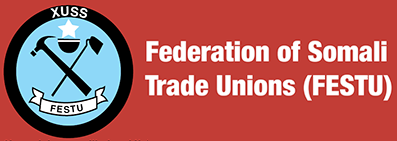The Federation of Somali Trade Unions (FESTU) applauds the official signing and ratification of seven International Labour Organisation (ILO) Conventions by Somalia’s Prime Minister, Mohamed Hussein Roble, on behalf of the Federal Government of Somalia, on 9 February 2021. This follows the unanimous approval by the Council of Ministers on 24 December 2020.
FESTU had been the lead initiator for the ratification of these instruments and is very proud about these historic milestone achievements for Somalia. By consistent lobbying for the ratification of these important ILO conventions, securing the support of the Ministry of Labour and Social Affairs (MOLSA) and employers, and advocating for proactive and constructive engagement between Somalia’s tripartite constituents, this outcome will continue to have significant implications on the working women and men of Somalia.
The following ratified conventions represent key strategic opportunities to address the challenges experienced by workers, including migrant workers and their families:
Three conventions on labour migration – Convention 97 on Migration for Employment Convention and Convention 143 on Migrant Workers (Supplementary Provisions) Convention; and Convention 181 on Private Employment Agencies Convention – will directly address the well-documented plight and abuses of Somali migrant workers who continue to face legal challenges and the lack of protection while seeking jobs abroad. These conventions will be the basis for the possible development of national labour migration policy and Somalia’s bilateral agreements with countries seeking migrant workers.
ILO Convention 190 on Violence and Harassment is one of the newest and probably one of the least ratified conventions. The convention is ground-breaking as is Somalia’s ratification of it; the convention recognises the gender dynamics within the workplace and the impact that gender inequality and gender-based violence has on women’s experience, productivity and promotion within the working environment. In particular, Convention 190 will assist the current campaign by trade unions to tackle sexual and gender based violence and lobby the enactment of a progressive sexual offences bill.
Convention 144 on Tripartite Consultation promotes the importance on tripartism and social dialogue to achieve Somalia’s labour related and development goals. The ratification of ILO convention 144 is a major milestone as it is a fundamental premise for the realization of harmonious labour relations between government, workers and employers.
The ratification of two ILO conventions on occupational health and safety, specially Conventions 187 and 155, will respond directly to the significant number of health and safety incidents that occur in Somalia, including the pervasive precarious and unsafe working conditions in Somalia as well as the failure of many employers to prioritise labour rights concerning safe and healthy working environment, issues of the physical and psychological well-being of workers.
While all this is a historic move for Somalia, it is long overdue and represents only the first step in working towards an enabling environment that protects and champions the rights of workers in Somalia.
“We acknowledge that Somalia has made impressive and strategic developments in regards to ratifying the ILO conventions and that this marks the beginning of a journey that will improve Somalia’s standing among the nations that recognise the need for international labour standards both in and outside the country,” says FESTU Secretary General, Omar Faruk Osman.
“By ratifying these internationally-recognised frameworks that set legal guarantees for workers, the Somali government is now obliged to ensure that our country’s domestic laws and policies are aligned to international standards and practice. It also presents to trade unions and other key stakeholders an important standard by which we should continue positive engagement with government and where necessary, play our oversight role in holding the government accountable.”
The next important step to the realisation of the rights set out in these conventions is for Somalia to domestic these instruments and ensure they inform the current and impending laws and policies. As such, FESTU would like to appeal to the Federal Government of Somalia to put in place mechanisms for the application and enforcement of the provisions of the conventions.
The primary beneficiaries of these conventions are workers and in the wake of the COVID-19 pandemic, these ratified conventions are the much-needed levers to assist Somalia in its resilient social and economic recovery.
FESTU wishes to acknowledge and recognise the supportive and leadership role played the Minister of Labour and Social Affairs, Duran Ahmed Farah, in expediting these historic ratifications.
Equally FESTU appreciates the ILO’s Bureau for Workers’ Activities (ACTRAV) for providing relevant technical assistance and advisory services that in no small measure boosted FESTU’s concerted effort at every stage of this process. Last but not least, special thanks to the team of the ILO project on free movement of persons and transhumance in the IGAD region for supporting the national crusade to popularise the migration conventions and secure their ratifications.
